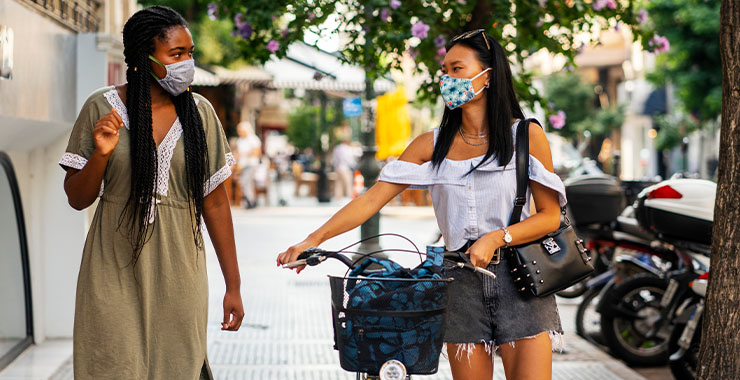
The COVID-19 pandemic has significantly altered our daily lives and continues to have a negative impact on mental health around the world. Initial CDC data suggests that prevalence of anxiety disorders is approximately 3 times what is was a year prior to the COVID-19 pandemic (Czeisler et al., 2020).
Social Anxiety Disorder impacts 7% of youth and adults and presents as extreme fear of negative evaluation in social situations(APA, 2013). While there is not specific data yet for the prevalence of Social Anxiety Disorder during the pandemic, we can safely assume that the pandemic has impacted social anxiety sufferers in both positive and negative ways. Some people have noticed an increase in social anxiety while coping with physical distancing and quarantine. Not surprisingly, for those who were already dealing with social anxiety, some may have actually noticed an improvement in their symptoms because they did not have to interact with people nearly as much (especially face-to-face) over the past year (Khan, Bilek, Tomlinson, & Becker-Haimes, 2021).
Now that we have somewhat adjusted to social distancing, we are newly faced with the dilemma of re-entering society. With COVID-19 rates changing week by week, mask mandates and social distancing protocols continue to shift, at times leaning towards life beginning to return to “a new normal.” But what does that mean for youth and adults living with Social Anxiety Disorder?
Many people are likely having anxiety about returning to social activities. There is a lot of uncertainty to navigate and this alone can increase social anxiety. Do I continue to wear masks or not, do I hug or fist bump? How do I start a conversation with someone I may not have seen for over a year? For those with Social Anxiety Disorder, it may seem almost impossible to start over.
Luckily, anxiety specialists are well trained to address these issues. They have been treating social anxiety with cognitive-behavioral and exposure therapy long before the pandemic began. We can rely on these proven methods in therapy to guide our approach toward social situations in the coming months, whether you have therapist or not. Here are some actions to consider when trying to manage your social concerns:
- Recognize that it is normal and acceptable to feel anxious. You’ve been out of practice in social settings for over a year now. It’s okay to feel anxious and you can handle those feelings. Acceptance of this reduces the fear that you are alone or that only you struggle with this.
- Start small and slow. Choose one safe activity you’d like to begin again (e.g., going to the gym, attending a club meeting). Do not feel pressure to re-start all of your previous activities at once.
- Notice thoughts that are getting in the way. If you’re thinking, “I’m so awkward now” or “I don’t have anything to talk about other than my vaccination,” those thoughts will only serve to increase your avoidance urges. Challenge or accept those thoughts in a way that helps you approach the situation (for example, “Yes, I do feel awkward. And I bet everyone else does, too.”) or prepare topics to discuss about new activities you are doing so you go in believing you have more to share.
- Challenge yourself. Once you’ve gotten used to one or two social situations, do something that makes you feel more uncomfortable (while still COVID-19 safe). Text someone you haven’t seen for awhile and ask them to meet up at a park. Accept an invitation for a first date. Try a new activity.
- Check in with your therapist or a friend. If you’re noticing difficulty “getting back out there,” it may be a good time to schedule some booster therapy sessions or simply ask a close friend to join you in a new activity.
For more social anxiety resources, visit: https://adaa.org/understanding-anxiety/social-anxiety-disorder
- American Psychiatric Association. (2013). Diagnostic and statistical manual of mental disorders (5th ed.).
- Czeisler, M. E., Lane, R. I., Petrosky, E., Wiley, J. F., Cristensen, A., Njai, R., … Rajaratnam, S. M. W. (2020). Mental health, substance use, and suicidal ideation during the COVID-19 pandemic – United States June 24-30, 2020. Morbidity and Mortality Weekly Report, 69, 1049-1057. doi:10.15585/mmwr.mm6932a1
- Khan, A. N., Bilek, E., Tomlinson, R. C., & Becker-Haimes, E. M. (2021). Treating social anxiety in an era of social distancing: Adapting exposure therapy for youth during COVID-19. Cognitive and Behavioral Practice. doi:10.1016/j.cbpra.2020.12.002
Face your fears. Live with uncertainty. Take control of your life.
Dr. Cameron Mosley is a Licensed Psychologist specializing in the assessment and treatment of anxiety disorders, OCD, and PCIT (Parent-Child Interactive Therapy)

